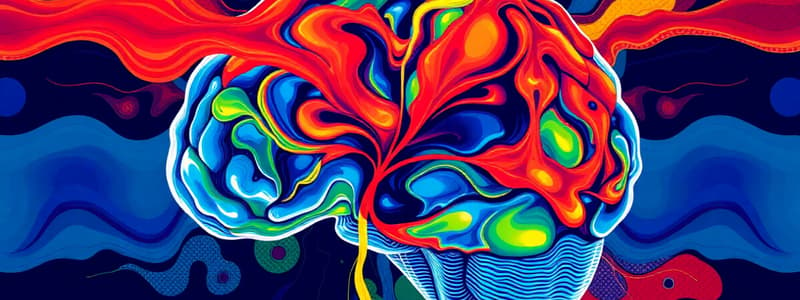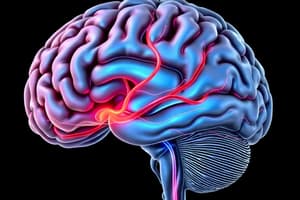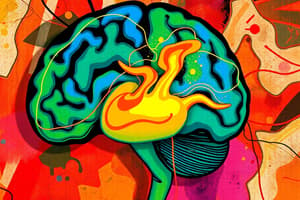Podcast
Questions and Answers
Which of the following scenarios would MOST likely result in elevated intracranial pressure (ICP)?
Which of the following scenarios would MOST likely result in elevated intracranial pressure (ICP)?
- An increase in cerebral perfusion pressure (CPP) with a stable mean arterial pressure (MAP).
- A decrease in mean arterial pressure (MAP) with stable cerebral perfusion pressure (CPP).
- A decrease in both mean arterial pressure (MAP) and cerebral perfusion pressure (CPP).
- An increase in mean arterial pressure (MAP) without a compensatory decrease in intracranial pressure (ICP). (correct)
A patient involved in a motor vehicle accident demonstrates an immediate loss of motor function, reflexes, and sensation below the level of injury. This is MOST indicative of:
A patient involved in a motor vehicle accident demonstrates an immediate loss of motor function, reflexes, and sensation below the level of injury. This is MOST indicative of:
- Cerebral edema.
- Increased intracranial pressure.
- Spinal shock. (correct)
- Autonomic dysreflexia.
A patient with Parkinson's disease is prescribed Levodopa. What is the PRIMARY mechanism of action of this medication?
A patient with Parkinson's disease is prescribed Levodopa. What is the PRIMARY mechanism of action of this medication?
- Decreasing glutamate activity in the brain.
- Increasing dopamine levels in the brain. (correct)
- Blocking the reuptake of serotonin.
- Inhibiting the breakdown of acetylcholine in the brain.
A client presents with right lower quadrant pain, nausea, and a low-grade fever. Which condition is MOST likely?
A client presents with right lower quadrant pain, nausea, and a low-grade fever. Which condition is MOST likely?
Which of the following physiological factors is the MOST direct cause of jaundice?
Which of the following physiological factors is the MOST direct cause of jaundice?
What is a PRIMARY concern when administering a tricyclic antidepressant (TCA) to a patient with a history of suicidal ideation?
What is a PRIMARY concern when administering a tricyclic antidepressant (TCA) to a patient with a history of suicidal ideation?
A patient with chronic kidney disease (CKD) is likely to exhibit which of the following electrolyte and acid-base imbalances?
A patient with chronic kidney disease (CKD) is likely to exhibit which of the following electrolyte and acid-base imbalances?
A patient is started on fluoxetine (Prozac) for depression. What is an IMPORTANT teaching point regarding discontinuation of this medication?
A patient is started on fluoxetine (Prozac) for depression. What is an IMPORTANT teaching point regarding discontinuation of this medication?
What is a PRIMARY advantage of SSRIs (selective serotonin reuptake inhibitors) compared to other groups of antidepressants, such as TCAs and MAOIs?
What is a PRIMARY advantage of SSRIs (selective serotonin reuptake inhibitors) compared to other groups of antidepressants, such as TCAs and MAOIs?
A patient with acute pyelonephritis is MOST likely to exhibit which of the following symptoms?
A patient with acute pyelonephritis is MOST likely to exhibit which of the following symptoms?
A patient is diagnosed with a stroke. The acronym 'FAST' is used to assess the patient. What does 'FAST' stand for?
A patient is diagnosed with a stroke. The acronym 'FAST' is used to assess the patient. What does 'FAST' stand for?
A patient is prescribed a monoamine oxidase inhibitor (MAOI). What POTENTIALLY life-threatening reaction can occur if dietary restrictions are not followed?
A patient is prescribed a monoamine oxidase inhibitor (MAOI). What POTENTIALLY life-threatening reaction can occur if dietary restrictions are not followed?
A patient develops hepatic encephalopathy secondary to cirrhosis. Which lab value is MOST directly related to the patient's altered mental status?
A patient develops hepatic encephalopathy secondary to cirrhosis. Which lab value is MOST directly related to the patient's altered mental status?
A patient is diagnosed with autosomal recessive disorder. Both parents are heterozygous carriers of the affected gene. What is the probability that their child will be affected by the disorder?
A patient is diagnosed with autosomal recessive disorder. Both parents are heterozygous carriers of the affected gene. What is the probability that their child will be affected by the disorder?
A patient is admitted with acute kidney injury secondary to heart failure. This is BEST categorized as what type of acute kidney injury?
A patient is admitted with acute kidney injury secondary to heart failure. This is BEST categorized as what type of acute kidney injury?
Which type of traumatic brain injury (TBI) typically shows no abnormalities on standard CT or MRI scans?
Which type of traumatic brain injury (TBI) typically shows no abnormalities on standard CT or MRI scans?
What is the MAIN mechanism of action of Aricept (donepezil) in the treatment of Alzheimer's disease?
What is the MAIN mechanism of action of Aricept (donepezil) in the treatment of Alzheimer's disease?
A patient with a history of frequent urinary tract infections (UTIs) asks about preventative measures. Which of the following is the MOST appropriate recommendation?
A patient with a history of frequent urinary tract infections (UTIs) asks about preventative measures. Which of the following is the MOST appropriate recommendation?
A patient who has suffered a traumatic brain injury (TBI) develops cerebral edema. Which type of cerebral edema involves swelling of the neurons themselves?
A patient who has suffered a traumatic brain injury (TBI) develops cerebral edema. Which type of cerebral edema involves swelling of the neurons themselves?
What is the MOST common cause of bowel obstruction?
What is the MOST common cause of bowel obstruction?
Flashcards
Cerebral Perfusion Pressure (CPP)
Cerebral Perfusion Pressure (CPP)
Pressure of blood in the brain, affected by blood pressure and intracranial pressure (ICP).
Coup and Countercoup Injury
Coup and Countercoup Injury
Traumatic brain injury caused by the brain moving inside the skull, hitting opposite sides.
Complication of Increased ICP: Brain Hernia
Complication of Increased ICP: Brain Hernia
Brain herniation occurs when increased ICP causes brain tissue to shift and compress.
Cytotoxic Edema
Cytotoxic Edema
Signup and view all the flashcards
Secondary Brain Injury
Secondary Brain Injury
Signup and view all the flashcards
Stroke S/S
Stroke S/S
Signup and view all the flashcards
Autonomic Dysreflexia
Autonomic Dysreflexia
Signup and view all the flashcards
Spinal Shock
Spinal Shock
Signup and view all the flashcards
Seizures: Partial vs Generalized
Seizures: Partial vs Generalized
Signup and view all the flashcards
Aura (Seizure)
Aura (Seizure)
Signup and view all the flashcards
Acute Pyelonephritis Manifestation
Acute Pyelonephritis Manifestation
Signup and view all the flashcards
Chronic Kidney Disease (CKD)
Chronic Kidney Disease (CKD)
Signup and view all the flashcards
Types of Acute Kidney Injury (AKI)
Types of Acute Kidney Injury (AKI)
Signup and view all the flashcards
Location of Appendicitis Pain
Location of Appendicitis Pain
Signup and view all the flashcards
Portal Hypertension
Portal Hypertension
Signup and view all the flashcards
Hepatic Encephalopathy
Hepatic Encephalopathy
Signup and view all the flashcards
Jaundice
Jaundice
Signup and view all the flashcards
Acute Pancreatitis Treatments
Acute Pancreatitis Treatments
Signup and view all the flashcards
PUD Treatment
PUD Treatment
Signup and view all the flashcards
SSRI Mechanism
SSRI Mechanism
Signup and view all the flashcards
Study Notes
- These notes cover key concepts but not all content on the exam.
Neurological Pathophysiology
- Cerebral Perfusion Pressure (CPP) is affected by blood pressure and intracranial pressure (ICP), impacting brain blood circulation.
- CPP = Mean Arterial Pressure (MAP) - ICP.
- Elevated ICP can result from various etiologies.
- Acceleration-deceleration injuries (coup and contrecoup) involve brain trauma due to rapid movement.
- Traumatic Brain Injury (TBI) presentation varies.
- Concussions do not show findings on CT/MRI scans.
- Complications of increased ICP include brain herniation.
Types of Edema
- Cytotoxic edema involves cellular swelling.
- Primary brain injury occurs at the time of the initial insult, while secondary injury evolves thereafter.
- Secondary brain injury involves inflammation and edema.
- Ischemic and hemorrhagic strokes have different risk factors and symptoms (FAST: Face, Arms, Speech, Time).
- Structural brain abnormalities like arteriovenous malformations (AVMs) and aneurysms are often asymptomatic until rupture.
- Autonomic dysreflexia leads to hypertensive crisis.
- Spinal shock causes paralysis at the time of injury.
- Parkinson's disease involves the loss of dopaminergic neurons.
- Seizures are classified as partial or generalized, sometimes preceded by an aura.
- Meningitis has specific clinical manifestations.
- Alzheimer's disease involves structural brain changes including a decrease in acetylcholine.
Genetics
- Autosomal recessive inheritance requires two copies of an abnormal gene for the disease to manifest.
- Autosomal dominant inheritance requires only one copy of an abnormal gene for the disease to manifest.
- Sex (X)-linked inheritance involves genes on the X chromosome.
- Understanding the chances of being affected or a carrier is crucial in genetic counseling.
- Penetrance refers to the proportion of individuals with a specific genotype that express the expected phenotype.
- Expressivity refers to the variation in phenotypic expression among individuals with the same genotype.
- Genotype is the genetic makeup and phenotype is the observable characteristics.
Shocks
- Different types of shock have varying signs and symptoms.
Renal Pathophysiology
- Acute pyelonephritis etiology involves a bacterial infection moving up to the kidneys, a common symptom is costovertebral angle (CVA) tenderness/flank pain.
- Acute pyelonephritis is an upper UTI.
- Chronic kidney disease leads to hypocalcemia and metabolic acidosis.
- Kidney stones are primarily composed of calcium.
Acute Kidney Disease
- Prerenal AKI is caused by heart failure, edema, ascites, hypotension and hypovolemia.
- Intrarenal AKI is caused by nephrotoxic (sepsis/septic shock, contrast media) insult.
- Postrenal AKI is caused by renal calculi, obstructed catheters and benign prostatic hyperplasia (BPH).
- Acute tubular necrosis is classified as intrarenal.
- Hypovolemia is classified as prerenal.
- Prostatic hypertrophy is classified as postrenal.
- UTIs have specific etiologies and symptoms.
GI System Pathophysiology
- Appendicitis pain is typically located in the right lower quadrant.
- Portal hypertension has key clinical manifestations.
- Hepatic encephalopathy is associated with increased ammonia levels.
- Jaundice is caused by hyperbilirubinemia.
- Acute pancreatitis pain location varies, treatment includes NPO and pain management, alcohol is a main etiology.
- Bowel obstruction risk factors include abdominal surgery, which is a main etiology.
- Peptic Ulcer Disease (PUD) has specific risk factors.
- PUD treatment includes prevention and proton pump inhibitor (PPI) medications.
Medications
- MAOIs have dietary restrictions that, if not followed, can lead to hypertensive crisis.
- SSRIs have advantages over other antidepressants.
- Fluoxetine (Prozac) requires specific instructions for discontinuation, including patient teaching.
- Cymbalta is used for peripheral neuropathy and depression.
- TCAs can cause cardiac toxicity, avoid prescribing to suicidal patients.
- Benzodiazepines work on the CNS, side effects require patient education.
- Seizure medications (Phenytoin, Valproic Acid, Keppra) require monitoring of plasma levels.
- Levodopa is used for Parkinson's disease, side effects require monitoring.
- Aricept and Memantine are used for dementia.
Additional Information
- Depression involves specific neuronal changes.
- Seizure disorders involve altered neuronal activities.
- Kidney disease can be identified through specific lab tests.
Studying That Suits You
Use AI to generate personalized quizzes and flashcards to suit your learning preferences.




